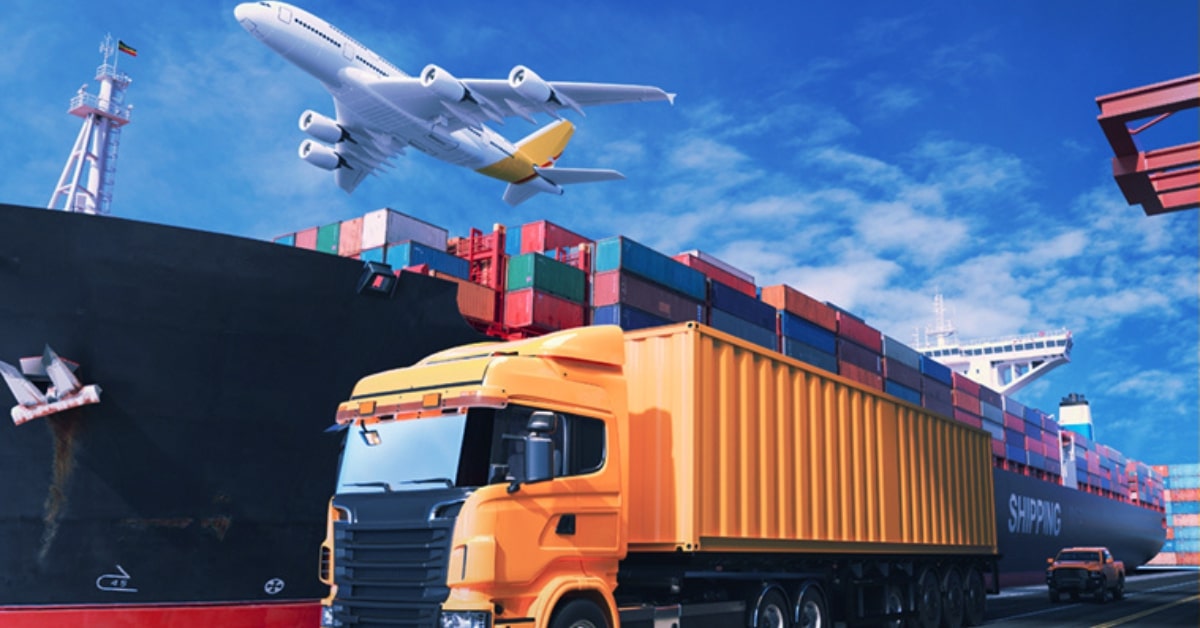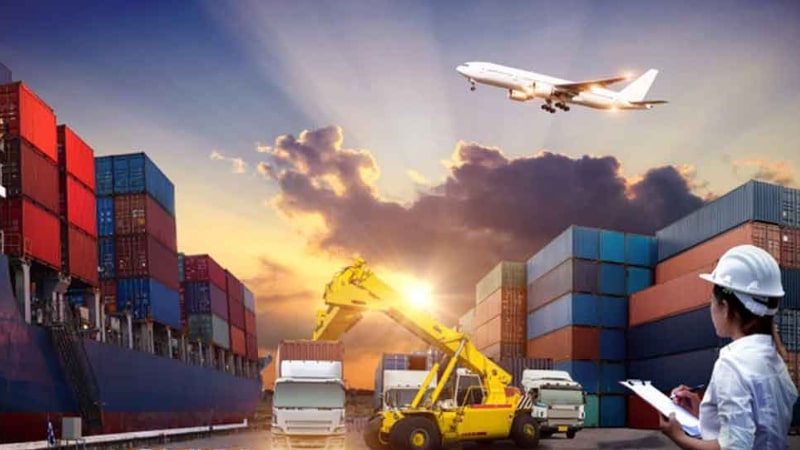Explaining the Freight Forwarding Process – 8 Best Steps
This is a guest post by Naveen Kumar.

Managing the supply chain and logistics work for any business is not an easy task. It can easily make or break any new business. Being a global business, if you want to survive in the worldwide market, you have to deal with the logistics process. A robust transport or logistics infrastructure is necessary to ensure safe and smooth shipments. Therefore, the freight forwarding process comes into play.
Freight forwarding is a subpart of logistics that ensures the smooth delivery of cargo globally. The process of freight forwarding is complex, involving various steps. It needs expertise in logistics and supply chain management to ensure the smooth delivery of goods between various international destinations.
The freight forwarding process is a central part of any international trade transaction. Knowing the steps involved can assist businesses in handling smooth shipments and on-time deliveries. So, in this blog, you will learn about such basic things involved in freight forwarding to have a complete overview of the process.
What is the freight forwarding process?
The organization and coordination of the successful transfer of goods between two destinations carried out by freight forwarders is known as the freight forwarding process. The transfer of goods and commodities across global borders is done on behalf of the shipper and receiver.
The process generally involves arranging the pick-up, transport, and delivery of goods. Apart from this, getting the necessary paperwork done and customs clearance are the major responsibilities of the forwarders. Hence, to ensure the shipment is legally compliant, here is how freight forwarders help make the freight forwarding process smooth.
How do freight forwarders assist in the freight forwarding process?
The middlemen responsible for the facilitation of the shipping are freight forwarders. Although they do not perform the shipping themselves, they provide freight forwarding services.
They prepare for the shipment of a company’s merchandise by making arrangements like storage, transportation, documentation, etc. Here are some of the services that a freight forwarder can provide:
- For importing or exporting goods, prepare all the necessary documents.
- Choosing a transportation provider to transfer the goods to the destination.
- They can also help to negotiate the charges in the place of clients.
- Filing insurance claims when necessary. Like, if any cargo gets damaged while in transportation, they can help you with the cargo insurance claim process.
- They help to manage the inventory during storage and transportation.
- They also ensure the correct label package.
With all such arrangements done by freight forwarders, the process becomes easier. These all are the basic tasks involved in a forwarding process at various stages. Let’s understand more about the steps involved.

What are the steps in the freight forwarding process?
The freight forwarding process requires several documents for exporting cargo as per different countries’ requirements. Regardless of the format and name difference, the information to be input is essentially the same. Here is the list of documents required for the process to fulfill all the necessary steps:
- Commercial invoice or bill
- Packing list
- Lading bill
- Export shipping bill
- Certificate of origin
- Inspection certificate
- Insurance certificate
- License and declaration document
After freight forwarders handle the paperwork for shipping and receiving logistics, the main steps that are followed under a freight forwarding process are discussed below.
- Export Haulage
The transportation of items from the shipper’s location to the freight forwarder’s location is called export haulage. A truck or train is usually required in this process. The time required for export haulage depends on different factors, like:
- Distance
- Location
- Type of items to be hauled
This step can usually take from a few hours to several weeks.
- Items Checkpoint
After the export haulage step, the goods are now with the freight forwarders. They will check and inspect them to confirm everything was transported smoothly and without any incident. They also match the booking items with the received order.
- Export Custom Clearance
Before items may leave the country, they require clearance from the country of origin. Custom brokers perform this procedure. They are expected to submit cargo details and any necessary supporting documents.
The consignor and shipper usually sign an agreement to have responsibility for the process. Many freight forwarding companies don’t support this agreement, in such cases, there are third-party custom brokers.
- Origin Handling
There are a variety of tasks that the freight forwarders or their agents may execute as part of the origin handling step of the operation. This normally involves the arrival and unloading of the cargo. Before giving the forwarder’s cargo receipt, the cargo is checked against the booking information.
The freight forwarding team also ensures that any item has restrictions if they are going to any other specific country other than their origin country. Some of the items may include:
- Drugs
- Flammable liquids
- Perishable items
- Alcohol, etc.
- Import Custom Clearance
Once the shipment arrives, the officials in the destination nation must verify the import customs documentation. One of the main points to note here is that the step may start even before the arrival of the shipment.
It is the responsibility of the freight forwarder or the agent to complete all the clearance formalities before the shipment arrives.
- Destination Handling
As part of the destination handling step, the freight forwarders perform a variety of tasks. At this stage, the freight forwarder office will receive all the necessary documents of the cargo, like carrier bills, outstanding documentation, and more.
Some of the functions of the destination handling step are:
- Getting the documentation from the freight forwarding office or agent.
- Reviewing all the documents.
- Submitting the carrier bills.
- Import Haulage
The next step is import haulage which is almost similar to export haulage. The shipment is transported to the destination from the warehouse. This process can be performed with the help of freight forwarders or the consignee who picks up the goods directly.
- Fast Deliveries
The freight forwarders or delivery agents may choose the mode of transport to deliver as per the cargo type and the distance between the warehouse and the destination. Usually, mileage and the mode of transport determine how long it will take to deliver the shipment. The recipient may get the goods from a few hours to a few days.
What are the benefits of the freight forwarding process?
As you have already read, the freight forwarding process is a little complex and involves multiple steps. But is it really necessary to opt for freight forwarders?
Let’s clear this confusion by knowing the importance of freight forwarding.
Cost-effectiveness
As freight forwarders are professionally trained for transporting goods across borders, they have the proper knowledge and resources to do effective shipment. They are well capable of negotiating the shipping prices. They can even consolidate the smaller shipments into larger ones to save resources. This helps to save the business costs.
Apart from saving operational costs, they are well capable of saving transport costs too as they know the effective transport routes.
Time Saver
As already mentioned, freight forwarding companies know the effective transport routes, so they can save a lot of time. They are well capable of handling all the logistics work from getting goods from the manufacturer to the final destination. This is especially helpful for small or new businesses as they may have less expertise and knowledge for handling the goods.
Tracking and visibility capabilities
A business can have a single point of contact for tracking the status of the shipment with the freight forwarders. They are also responsible for updating the status of the shipments. After getting the status of the shipments, businesses can plan their logistics and inventory processes accordingly. One can have an estimated arrival time and exact location of the shipment to manage the supply chain.
Having expertise in customs and regulations
Another important benefit of taking the assistance of freight forwarding companies is their expertise in customs and regulations. They have a deep understanding of the rules and regulations of different nations. This helps to comply with necessary laws and regulations.
International shipments require proper documentation which can be hard for businesses to handle on their own. With this, businesses can avoid costly fines and penalties for non-compliance.
Concluding Thoughts
This blog focused on the freight forwarding process. The steps discussed above are the general framework of the freight forwarding industry. The major role of freight forwarders is to include proper routes and select the best transport options for any business.
Many industries get the benefit of freight forwarding, especially the ones involved in international trading. Some of the industries are:
- Manufacturing
- Medical
- E-commerce
- Construction, etc.
Freight forwarding is beneficial for businesses of all sizes. Whether you are new or a seasoned business company, the freight forwarding process can help you in various ways. By involving any freight forwarder for any business, one can focus on increasing the productivity and revenue of the company.
By now you must have understood the complete details of a freight forwarding process and how it can help in various ways. Still, if you have any questions in mind, feel free to ask. We will connect with you soon!
Hope you find this blog informative!

This was a guest post by Naveen Kumar.
Author Bio
Naveen Kumar is the marketing and product head at Nitic company. He is also an occasional writer who loves to share his ideas with people through his writings.





